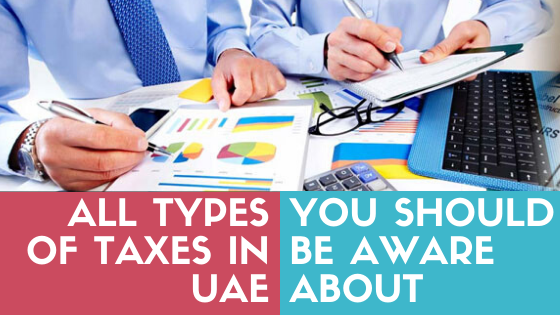Types of Taxes in UAE – There is a very good reason why businesses have flourished in the UAE. It has maintained a business environment that does not put too much pressure on the taxation system. The tax liberalization policy followed by the UAE has taken a lot of load off the backs of businesses. But a country needs money to develop. The facilities provided to the public do not come cheap. As a result, the country has come up with taxes. Though they are not as taxing as the rest of the world, it is good to have an idea of their types and nature.

- Value Added Tax
Value Added Tax was introduced by the UAE government on January 1, 2018. It is an indirect tax as it resembles the newly introduced Goods and Services Tax (GST) introduced in India around the same time. This consumption tax is charged on a product at every level of sale. The VAT can be distinguished from sales tax on the point that it is charged on every stage of the sale in the supply chain, unlike sales tax which is chargeable only at the time of final sale. Like GST in other countries, the standard VAT rate in the UAE is 5%. However, some goods and services carry 0% rated while few other supplies are exempt from VAT. A business can claim the VAT paid on business expenses incurred for purchase related to taxable supplies.
- Corporate Tax
There is a level of tax that is levied on business on its business income calculated at the end of the financial year. Only that part of the business’ income is taxable that is earned through its core business activities. Corporate Tax has started to be levied only on foreign banks and oil companies. Other industries and companies operating out of their purview are not covered by this tax. There are some exemptions in these businesses too. If a business is registered in a free zone, it becomes exempt from this tax for a stipulated time period and this time can be extended as per the legal regulations. Rules that bind the free zones are applicable to them as well. Speaking to a good Tax Consultant UAE has to offer will make matters simpler.
- Excise Tax
The Excise tax was introduced in UAE on October 1, 2017. It is charged only on products that are considered to be unhealthy, like confectionery, tobacco, alcohol, fast food, and soft drinks. This tax is levied on both the manufacturer and the customer, depending upon the product. The point of difference between VAT and excise in the UAE is that the latter is imposed only on some goods. Excise taxes charged for soft drinks is 50% and for tobacco products and energy drinks is 100%.
- Income Tax
One of the best things about having a job in UAE is that it does not levy Income Tax on individual income. This is why more people will likely flock to Dubai and the UAE to look for jobs.
- Custom Duty
Custom Duty is a tax that is levied on businesses when products are imported and on a few products that are exported. The Federal Customs Authority is responsible for levying and executing the customs rules and impositions. The standard rate of custom duty in the UAE is 5%. The amount to be charged as custom duty is mostly charged on the Cost, Insurance and Freight (CIF) value of products. In the case of alcohol, 50% is charged by the customs department and for cigarettes, 100% is charged. A good Tax Consultant UAE has can be consulted for further clarification.
- Double Taxation
The UAE has 94 agreements with other countries to avoid double taxation on overseas investments. The agreements on the Avoidance of Double Taxation are aimed to promote and diversify the country’s national income. The other reasons are:
- To avoid tax evasion and added indirect taxes
- To facilitate international trade and investment
- To promote the transfer of goods, services and capital
- Tourism Tax
There are some taxes that are levied on tourists visiting the UAE. The taxes they are likely to pay are:
- 10% service charge
- 6% tourism fees
- 10% tax on room charges
- 10% municipality fees
- 6-10% city tax
UAE has started a tourist’s VAT refund since the 18th of November, 2018.
